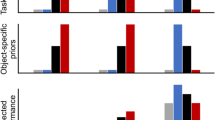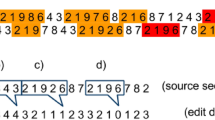Abstract
SINCE 1962 several investigators have reported experimental results supporting the claim that Pavel Stepanek of Prague could demonstrate an ESP ability in a simple test situation. In the test used, Stepanek attempted on each trial to say whether the green or the white side of a card hidden in an opaque cover was presented upward. Two of us1 summarized the literature dealing with this subject and presented confirmatory evidence obtained in stringently safeguarded experimental conditions.
This is a preview of subscription content, access via your institution
Access options
Subscribe to this journal
Receive 51 print issues and online access
$199.00 per year
only $3.90 per issue
Buy this article
- Purchase on Springer Link
- Instant access to full article PDF
Prices may be subject to local taxes which are calculated during checkout
Similar content being viewed by others
References
Blom, J. G., and Pratt, J. G., J. Amer. Soc. Psychical Res., 62, 28 (1968).
Author information
Authors and Affiliations
Rights and permissions
About this article
Cite this article
PRATT, J., STEVENSON, I., ROLL, W. et al. Identification of Concealed Randomized Objects through Acquired Response Habits of Stimulus and Word Association. Nature 220, 89–91 (1968). https://doi.org/10.1038/220089a0
Received:
Issue Date:
DOI: https://doi.org/10.1038/220089a0
This article is cited by
-
Identification of Concealed Randomized Objects
Nature (1970)
-
Identification of Concealed Randomized Objects
Nature (1969)
-
ESP: Deficiencies of Experimental Method
Nature (1969)
-
Parapsychology
Nature (1969)
Comments
By submitting a comment you agree to abide by our Terms and Community Guidelines. If you find something abusive or that does not comply with our terms or guidelines please flag it as inappropriate.



